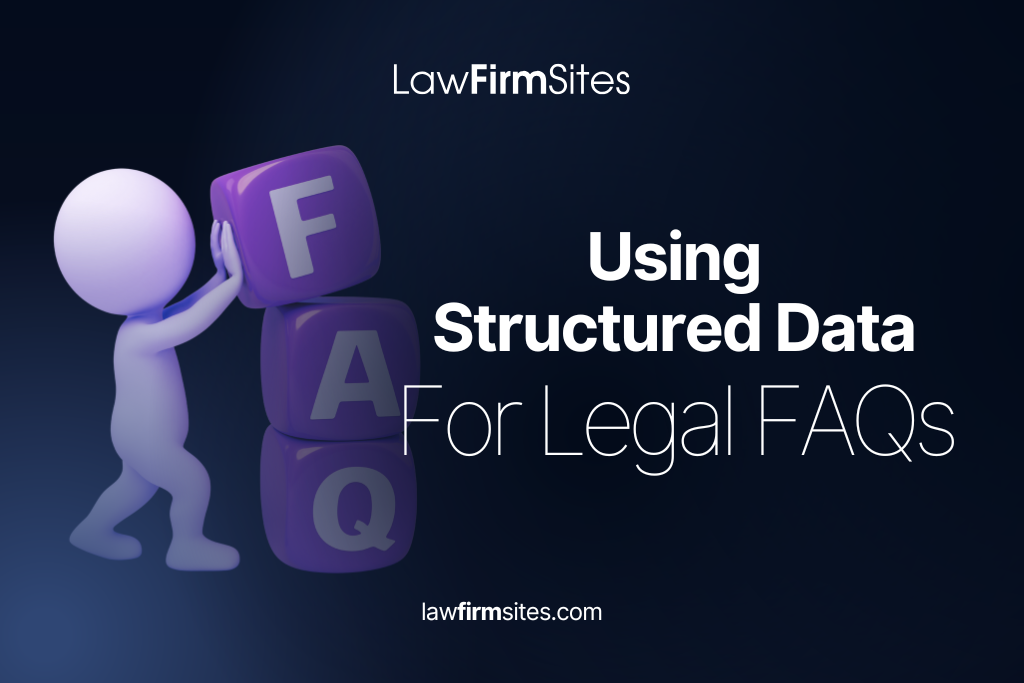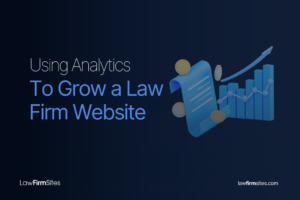Using Structured Data for Legal FAQs

Structured data helps search engines understand the meaning of your content, not just the words on the page. For law firm websites, that clarity turns frequently asked questions into scannable, searchable answers that surface where potential clients look first. When legal FAQs are marked up correctly, they can unlock rich results and improve how your pages appear in search. Using this strategy results in a smoother path from question to qualified inquiry.
What is Structured Data?
Structured data is a standardized way to annotate content so search engines can interpret entities, relationships, and intent. While structured data alone does not increase rankings, it makes pages eligible for search features like rich results and enhanced snippets that can improve visibility and click‑through. In practice, that means a probate FAQ with valid markup can display concise questions and answers directly within the search experience, helping users identify relevance faster.
Structured data serves both discovery and comprehension. Discovery improves when search engines can index the right question‑answer pairs for a practice area. Comprehension improves when the markup clarifies context, such as the jurisdiction, audience, and topic. For law firms, this precision matters because legal queries often hinge on scope, procedure, and timing rather than generic keywords.
Legal FAQs and Their Role in Law Firm Website Content
Legal FAQs sit at the crossroads of user intent and client education. Prospective clients often arrive with urgent, narrow questions about deadlines, eligibility, or first steps, and they value immediate, plain‑language answers before they speak with an attorney. When your FAQs are structured, each question becomes an addressable data point that search engines can map to a user’s phrasing. That improves the chance that a page from your site appears for variant queries that share the same need.
Integrating structured data with legal FAQs starts with purposeful information architecture. It is important to group questions by practice area, jurisdiction, and procedural stage, and reflect that hierarchy in headings, internal links, and breadcrumb paths. Legal FAQs also play a retention role once users arrive. A well‑structured page allows visitors to scan, expand, and follow related links without friction. Because each answer is short, complete, and linked to a deeper resource, users can self‑educate and then take action when they are ready, which improves lead quality.
Featured Snippets and their Relation with Law Firm Website FAQs
Featured snippets are special search results that extract a concise answer and place it above the traditional organic listings. Structured data is not required for a featured snippet, yet clear question‑focused writing and clean on‑page structure make selection more likely. Legal FAQs inherently follow that pattern by pairing a direct question with a succinct answer, which aligns with how featured snippets are chosen.
When building towards featured snippets, draft answers that resolve the question in the first sentence, then add a brief explanation with qualifying details such as jurisdiction, timeline, or threshold amounts. Use page sections with descriptive subheadings that restate the question in natural language. Ensure that the title tag, meta description, and first paragraph reinforce the query so the page signals topical authority. By combining these editorial practices with valid FAQ markup, you increase the odds that Google can identify the best passage to feature while also making the page eligible for other enhancements.
How to Leverage AI Software in Helping Generate FAQs and Lists?
AI can accelerate the entire FAQ lifecycle, from discovery to drafting and refinement, while keeping human judgment at the center. One can start by using AI to analyze search queries, intake transcripts, chat logs, and support email threads to surface recurring questions that reflect real client intent. Cluster those questions by practice area, jurisdiction, and procedural step so the final FAQ set maps cleanly to how users search and how your site is organized. Treat the AI output as a starting point that highlights patterns and gaps rather than as final copy.
AI also helps with phrasing and variant discovery, which matters because people ask the same legal question in many ways. Craft a prompt to suggest natural‑language variations that account for lay terms, acronyms, and common misspellings without drifting into legal inaccuracies. Refine the phrasing to keep each question specific, jurisdiction‑aware, and answerable in a few sentences. This approach improves alignment with voice search and increases the chance that a single authoritative answer can address multiple long‑tail queries.
For drafting answers, use AI to produce first‑pass summaries that are concise, plain‑language, and scoped to a particular state or court system. Provide the model with your firm’s style guidelines, statutory citations, and internal references so the output reflects your voice and preferred level of detail. Always complete legal review by a licensed attorney who verifies statutes, deadlines, and procedural steps before publication. The goal is to combine AI speed with attorney‑led accuracy, preserving trust and compliance.
In the end, responsible use of AI tools is essential when working with sensitive legal topics. It is important to avoid submitting client‑identifying data to external tools and redact personally identifiable information before analysis to protect confidentiality. Prefer vendors with documented security controls and data retention policies, and store your prompt libraries and approved answer templates in a version‑controlled repository. By combining privacy‑conscious workflows with attorney oversight, AI becomes a reliable partner that scales your FAQ production without compromising accuracy or user trust.
Crafting a Structured Approach for Legal FAQs
An effective approach begins with identifying practice area‑specific questions. It starts by mapping the top tasks a prospective client needs to accomplish, such as filing deadlines for wrongful death claims, how to open a probate case, or the difference between a conservatorship and a guardianship in your state. Align each question to intent categories like informational, transactional, or local, and note jurisdictional qualifiers that change the answer. Source questions from search query data, intake transcripts, and “People also ask” patterns to capture real phrasing that people use. Here are other tips to keep in mind:
Craft contextual and keyword‑rich answers that read naturally
Lead with a direct answer written in plain language, then provide a short rationale with definitions, thresholds, and timelines. Include jurisdiction or court references that shape the advice, and link to the canonical resource on your site where a reader can learn more. Keep each answer brief to preserve skimmability and use internal links to route deeper research to service pages, attorney bios, and related guides.
Content precision
Precision is essential for sensitive topics like conservatorships, trustee removal, will and trust contests, financial elder abuse litigation, accounting disputes, and trust interpretation controversies. For these subjects, verify statutes, deadlines, and standards of proof for your jurisdiction and state them with measured language. Avoid vague phrasing and avoid promotional claims. Clear, vetted answers build trust and align with search quality expectations.
Seamless integration and user experience complete the strategy
Place the FAQ section where it adds value on a page rather than burying it at the bottom. Design for skimming by using collapsible sections with accessible labels and by limiting each answer to a few sentences that cover the essentials. Add cross‑links to related FAQs so readers can follow a learning path without hitting dead ends. Validate your markup with a testing tool and monitor Search Console for enhancement reports and potential manual issues.
Quality assurance protects eligibility for enhancements
Ensure each question has one definitive answer and avoid promotional or lead‑only answers that fail to inform the reader. Keep answers consistent with the visible on‑page content, because discrepancies can lead to loss of eligibility for rich presentation.
Compliance and accuracy are central concerns for legal publishers
Structured data should never misrepresent the scope of your services or the jurisdiction of your advice. Include a brief disclaimer below the FAQ module that clarifies the informational purpose of the content and encourages readers to seek counsel for their specific facts. Maintain a review cadence so statutes, filing fees, and procedural steps reflect the most recent guidance in your state.
Monitoring and improvement keep the FAQ strategy aligned with real demand
Review Search Console performance for pages with FAQ markup and segment by query to see which questions drive impressions and clicks. Track bounce rate and time on page to locate answers that need clearer language or more helpful links. Expand or refine question sets when new laws, court decisions, or seasonal patterns change user behavior.
Visibility outcomes are broader than a single enhancement
Valid structured data can generate more engaging search listings when Google chooses to show FAQ‑style elements and can also help third‑party assistants better understand your content. Even when rich results are limited, the underlying information architecture and editorial clarity improve crawling, indexing, and user satisfaction. That makes legal FAQs a durable asset in a content ecosystem focused on authority, usefulness, and trust.
Formulate a Solid Legal Marketing Structure for your Firm
Structured data transforms legal FAQs from a simple list into a machine‑understandable resource that meets users at the moment of need. By pairing precise, jurisdiction‑aware writing with valid page markup, law firms improve visibility opportunities and reduce friction for people looking for clear answers. The same framework supports featured snippets by presenting concise, high‑quality passages that respond directly to a query.
If you want help turning your FAQs into a search‑ready asset, our team at Law Firm Sites can guide your next steps without the hard sell, starting with a review of your current pages.
Did you like this post? Here are some others you might enjoy:

For most law firms, growth depends on being visible at the exact moment a potential client searches for help. Pay‑per‑click…

Strong legal marketing rewards depth. When potential clients face high-stakes decisions, they search for thorough, trustworthy guidance that clearly explains…

Data is the most reliable guide for growing a law firm website because it shows what clients actually search, where…

